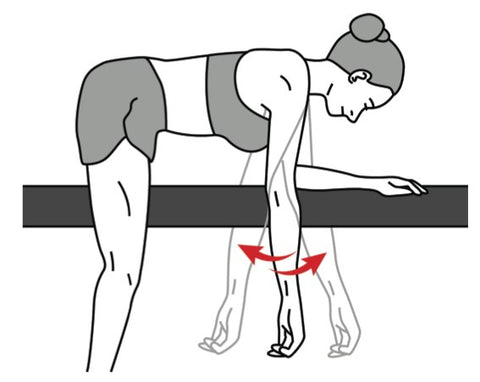
With a frozen shoulder it's always beneficial to get started as soon as possible with regular, gentle exercises.
The last thing you feel like doing if you have a frozen shoulder is moving it! However, the reality is that it is very important to keep the shoulder moving as much as possible.
Admittedly there are times when the shoulder is so acutely painful that all you can do is rest and put ice onto it. But it is beneficial to get started as soon as possible with regular, gentle exercises. These will help to:
• Aid the recovery and shorten the duration of your frozen shoulder. Prolonged immobility will only make the stiffness worse and allow inflammation to build up in and around the shoulder tissues, thus creating more pain.
• Significantly speed up your recovery. There is plenty of research evidence that shows that the cells which make fibrous bands in muscles (fibroblasts) respond well to mechanical activity. Exercise and stretching loosens the scar tissue that builds up in damaged muscles, and promotes increased healing.
• Have a positive effect on general well being. We often hear from patients about the general feeling of helplessness that is associated with a frozen shoulder, “there is nothing I can do”. Exercise helps to combat your lowered mood and allows you to “take charge” of the situation. Also exercise releases endorphins which have a well documented positive effect on mood.
• Improve muscle function and co-ordination. Right from day 1 of your frozen shoulder there is a loss of mutual muscle co-ordination and co-operation of the rotator cuff muscles. This occurs at the level of the brain. Exercising daily helps to reverse these effects.
• Stretch the sore and damaged muscle fibres in a controlled, co-ordinated and constructive way; lengthening the contracted and damaged areas within the muscles.
• Strengthen the weakened and (often) ‘wasted’ muscles.
• Speed up recovery - this is probably the most crucial thing from your perspective.

Are there any risks in exercising?
Really the risks of not exercising are much worse. As long as you avoid that sharp, catching type of pain that is associated with the early phases of your frozen shoulder there should be no risk of making the shoulder worse. Do follow these simple rules:
Always exercise to potential. It is important especially initially to start gently. Start with something that you know you can handle and step it up. Going into a major exercise routine too quickly will only make you sore!!
If it hurts stop!! Doing exercise that is painful is not beneficial – there are some people who have the attitude “no pain, no gain” this may be true in some cases but not in relation to rehabilitation exercises. Some slight aching in the shoulder during and after exercise can be expected but if it makes the pain worse you are doing too much.
Комментариев нет:
Отправить комментарий